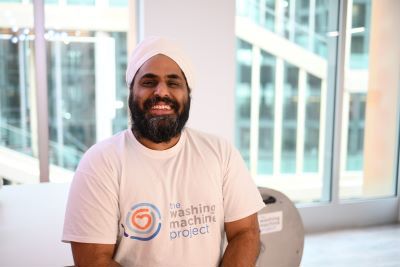The washing machine is a prime example of this. Originally invented in the 1880s, the electric washing machine had become commonplace in UK and US households by the mid-20th century, transforming both the hygiene standards in society and removing the task of strenuous, time-consuming handwashing.
Almost a century later, however, much of the world’s population still do not have access to an electric washing machine. In fact, 70 per cent of the world’s population wash their clothes by hand. The combination of installation demands, costs and reliable water and electricity supply, often denies low-income and displaced communities the benefits that washing machines can bring.
But work is being done to change this. Harnessing innovations in design and engineering, means organisations are now seeking out ingenious solutions to rectify this gap and empower communities around the world.
The washing machine effect
The introduction of the washing machine into society had two significant implications. The first was the improved cleanliness of the general population. The second was the profound impact on the daily lives of women in the mid-20th century. Alongside other household appliances like vacuum cleaners and refrigerators, the washing machine played a crucial role in automating domestic tasks, which relieved women from the most strenuous and time-consuming unpaid domestic activities and opened the door to pursue paid employment.
In developing and displaced communities without such household appliances, women can be disproportionately burdened with unpaid strenuous labour and household care, spending hours on washing clothes and sheets which prevents them from engaging in paid work that would financially empower them.
The Washing Machine Project
The mission to empower these communities is the driving force behind the initiative ‘The Washing Machine Project.’ The initiative is based on the principle that the innovative design and inventive use of materials and space can overcome integral engineering barriers - something that can drive humanitarian and development challenges. With this front and centre, the initiative set about the task of providing accessible, off-grid washing solutions, for those who don’t have access.
To achieve this there were several barriers to overcome. Firstly, the washing machines needed to be easily assembled and serviceable by those in the community, due to the impracticality of dispatching engineers for repairs to remote locations. The design needed to be reliable and of high-quality, as well as functional on less water, washing detergent and electricity usage than in developed societies, due to limited supply.
The result was the development of the world’s first flatpack washing machine, drawing inspiration from the minimalist ethos of IKEA.
The creation requires nothing more than basic tools and simple instructions for assembly, allowing an average individual with limited technical expertise to put it together in roughly an hour. It is also easy to disassemble, repair and reassemble – testament to its practicality and resilience. The flatpack design also simplifies logistics, a crucial consideration given the global distribution of the washing machines.
To ensure the quality and reliability of the design could be maintained, The Washing Machine Project team transitioned from plastic to predominantly stainless-steel construction, ensuring longevity and recyclability. Precision-laser-cut sheet metal components, neatly wrapped and riveted, further enhance durability. Consequently, the flatpack design results in a lighter, more flexible, and longer-lasting washing machine, significantly reducing water and detergent consumption compared to handwashing, and ultimately giving communities time back.
A global impact
Through relentless dedication to improving accessibility, usability, and sustainability, The Washing Machine Project is connected to communities across the world to ensure they reach those most in need, through partnerships with global NGOs and local organisations.
Recent projects include supplying a machine to a school in Kenya, which provides education for children who are homeless or have been orphaned. The project is also engaged in a programme to supply a washing machine for regular washing days on Lancaster Street in Fort Worth, Texas, which has one of the highest densities of homelessness in the USA. Additional projects are also taking place in Kiribati - the world’s smallest and hardest-to-reach island in the central Pacific, and in the Kyangwali Refugee Settlement in Uganda.
The initiative also partners with major organisations who shared their dedication to the cause. RS has contributed components and funding to the project. Back in 2022, 350 colleagues across the UK spent time at The Washing Machine Experience at their Corby site. By sharing this one-day experience they not only helped build 32 washing machines but also learnt and understood what life was really like for those who endure the back-breaking task of hand-washing clothes in rivers and streams, using the time they could have otherwise spent going to school, playing with friends or more meaningful and joyful tasks. Through partnerships and collaboration like this, the project’s reach is becoming truly global.
Final thoughts
The Washing Machine Project serves as a reminder of the profound impact that technological ingenuity and innovative engineering can have on human lives. Beyond mere convenience, access to clean laundry signifies dignity, autonomy, and a pathway to economic opportunity. If we work together, we can innovate solutions that empower communities and promote a better, more equal world for everyone.

Nav Sawhney, founder and CEO of The Washing Machine Project





Labour pledge to tackle four key barriers in UK energy transition
I'm all for clarity and would welcome anyone who can enlighten me about what Labour's plans are for the size and scale of this Great British Energy....